Professional Development: Reflection Report and Gibbs Model Analysis
VerifiedAdded on 2023/01/11
|7
|1209
|26
Report
AI Summary
This report provides a detailed reflection on a team presentation experience using the Gibbs Reflective Model. The report begins with an introduction to reflective writing and the Gibbs model, followed by a step-by-step analysis of the experience. The description stage outlines the team activity, while the feelings stage explores the student's initial nervousness and eventual confidence. The evaluation stage highlights time management issues and the development of presentation skills. The analysis stage identifies the gap between theory and practice, emphasizing the importance of smart work and the positive impact of presentation feedback. The conclusion summarizes the key learnings, particularly the need for improved time management. Finally, an action plan is developed, focusing on data analytical skill development, time management training, and regular follow-up activities to maintain and enhance the developed skills.
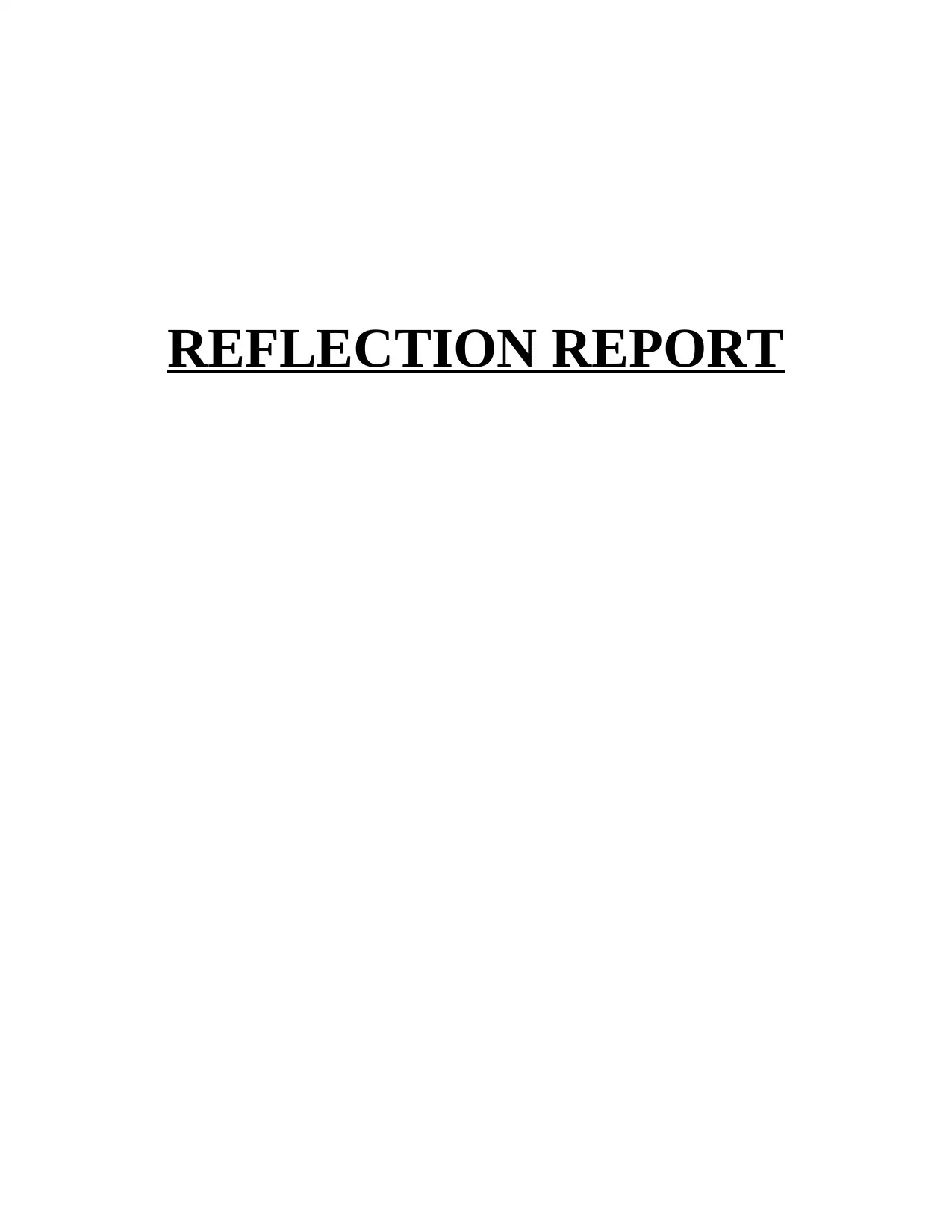
REFLECTION REPORT
Paraphrase This Document
Need a fresh take? Get an instant paraphrase of this document with our AI Paraphraser
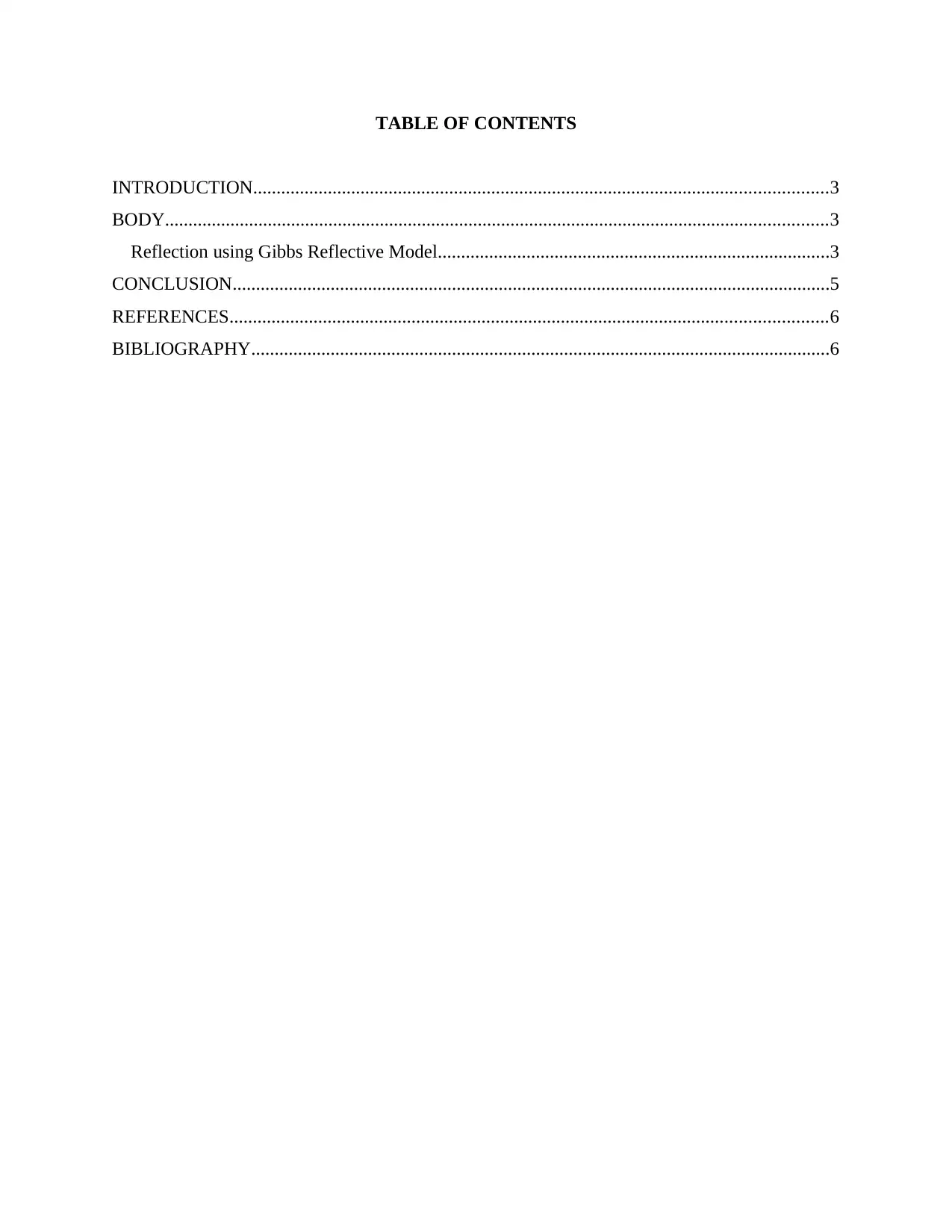
TABLE OF CONTENTS
INTRODUCTION...........................................................................................................................3
BODY..............................................................................................................................................3
Reflection using Gibbs Reflective Model....................................................................................3
CONCLUSION................................................................................................................................5
REFERENCES................................................................................................................................6
BIBLIOGRAPHY............................................................................................................................6
INTRODUCTION...........................................................................................................................3
BODY..............................................................................................................................................3
Reflection using Gibbs Reflective Model....................................................................................3
CONCLUSION................................................................................................................................5
REFERENCES................................................................................................................................6
BIBLIOGRAPHY............................................................................................................................6
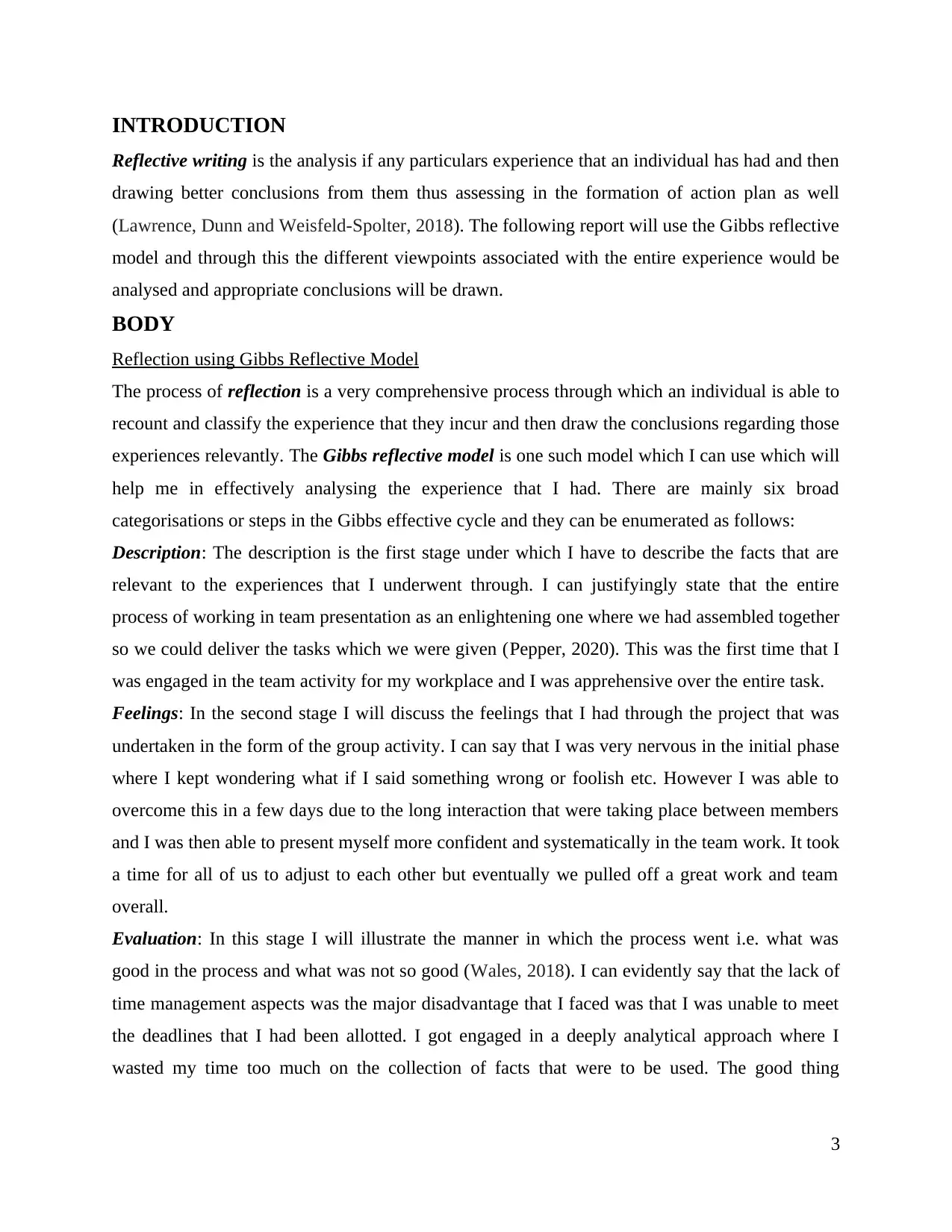
INTRODUCTION
Reflective writing is the analysis if any particulars experience that an individual has had and then
drawing better conclusions from them thus assessing in the formation of action plan as well
(Lawrence, Dunn and Weisfeld-Spolter, 2018). The following report will use the Gibbs reflective
model and through this the different viewpoints associated with the entire experience would be
analysed and appropriate conclusions will be drawn.
BODY
Reflection using Gibbs Reflective Model
The process of reflection is a very comprehensive process through which an individual is able to
recount and classify the experience that they incur and then draw the conclusions regarding those
experiences relevantly. The Gibbs reflective model is one such model which I can use which will
help me in effectively analysing the experience that I had. There are mainly six broad
categorisations or steps in the Gibbs effective cycle and they can be enumerated as follows:
Description: The description is the first stage under which I have to describe the facts that are
relevant to the experiences that I underwent through. I can justifyingly state that the entire
process of working in team presentation as an enlightening one where we had assembled together
so we could deliver the tasks which we were given (Pepper, 2020). This was the first time that I
was engaged in the team activity for my workplace and I was apprehensive over the entire task.
Feelings: In the second stage I will discuss the feelings that I had through the project that was
undertaken in the form of the group activity. I can say that I was very nervous in the initial phase
where I kept wondering what if I said something wrong or foolish etc. However I was able to
overcome this in a few days due to the long interaction that were taking place between members
and I was then able to present myself more confident and systematically in the team work. It took
a time for all of us to adjust to each other but eventually we pulled off a great work and team
overall.
Evaluation: In this stage I will illustrate the manner in which the process went i.e. what was
good in the process and what was not so good (Wales, 2018). I can evidently say that the lack of
time management aspects was the major disadvantage that I faced was that I was unable to meet
the deadlines that I had been allotted. I got engaged in a deeply analytical approach where I
wasted my time too much on the collection of facts that were to be used. The good thing
3
Reflective writing is the analysis if any particulars experience that an individual has had and then
drawing better conclusions from them thus assessing in the formation of action plan as well
(Lawrence, Dunn and Weisfeld-Spolter, 2018). The following report will use the Gibbs reflective
model and through this the different viewpoints associated with the entire experience would be
analysed and appropriate conclusions will be drawn.
BODY
Reflection using Gibbs Reflective Model
The process of reflection is a very comprehensive process through which an individual is able to
recount and classify the experience that they incur and then draw the conclusions regarding those
experiences relevantly. The Gibbs reflective model is one such model which I can use which will
help me in effectively analysing the experience that I had. There are mainly six broad
categorisations or steps in the Gibbs effective cycle and they can be enumerated as follows:
Description: The description is the first stage under which I have to describe the facts that are
relevant to the experiences that I underwent through. I can justifyingly state that the entire
process of working in team presentation as an enlightening one where we had assembled together
so we could deliver the tasks which we were given (Pepper, 2020). This was the first time that I
was engaged in the team activity for my workplace and I was apprehensive over the entire task.
Feelings: In the second stage I will discuss the feelings that I had through the project that was
undertaken in the form of the group activity. I can say that I was very nervous in the initial phase
where I kept wondering what if I said something wrong or foolish etc. However I was able to
overcome this in a few days due to the long interaction that were taking place between members
and I was then able to present myself more confident and systematically in the team work. It took
a time for all of us to adjust to each other but eventually we pulled off a great work and team
overall.
Evaluation: In this stage I will illustrate the manner in which the process went i.e. what was
good in the process and what was not so good (Wales, 2018). I can evidently say that the lack of
time management aspects was the major disadvantage that I faced was that I was unable to meet
the deadlines that I had been allotted. I got engaged in a deeply analytical approach where I
wasted my time too much on the collection of facts that were to be used. The good thing
3
⊘ This is a preview!⊘
Do you want full access?
Subscribe today to unlock all pages.

Trusted by 1+ million students worldwide
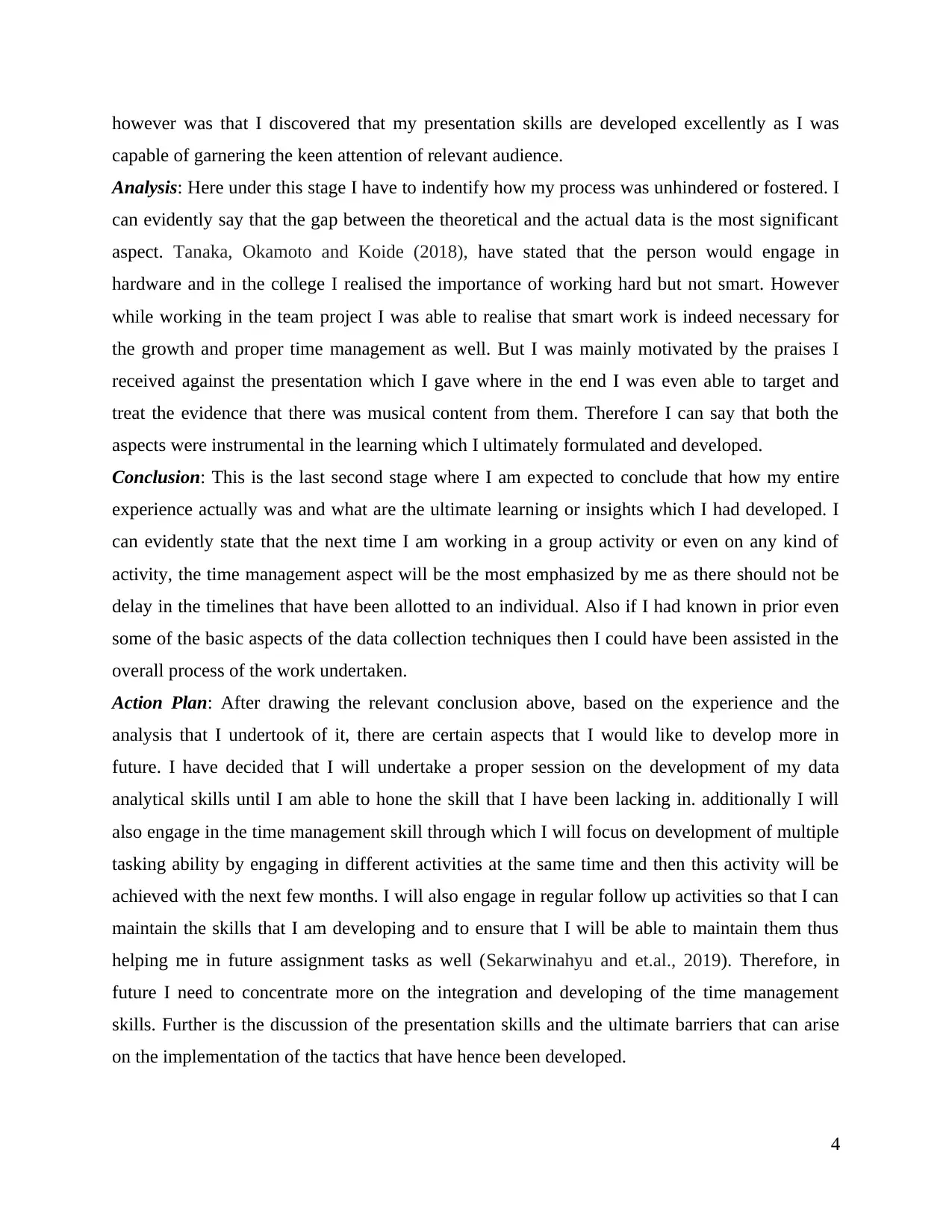
however was that I discovered that my presentation skills are developed excellently as I was
capable of garnering the keen attention of relevant audience.
Analysis: Here under this stage I have to indentify how my process was unhindered or fostered. I
can evidently say that the gap between the theoretical and the actual data is the most significant
aspect. Tanaka, Okamoto and Koide (2018), have stated that the person would engage in
hardware and in the college I realised the importance of working hard but not smart. However
while working in the team project I was able to realise that smart work is indeed necessary for
the growth and proper time management as well. But I was mainly motivated by the praises I
received against the presentation which I gave where in the end I was even able to target and
treat the evidence that there was musical content from them. Therefore I can say that both the
aspects were instrumental in the learning which I ultimately formulated and developed.
Conclusion: This is the last second stage where I am expected to conclude that how my entire
experience actually was and what are the ultimate learning or insights which I had developed. I
can evidently state that the next time I am working in a group activity or even on any kind of
activity, the time management aspect will be the most emphasized by me as there should not be
delay in the timelines that have been allotted to an individual. Also if I had known in prior even
some of the basic aspects of the data collection techniques then I could have been assisted in the
overall process of the work undertaken.
Action Plan: After drawing the relevant conclusion above, based on the experience and the
analysis that I undertook of it, there are certain aspects that I would like to develop more in
future. I have decided that I will undertake a proper session on the development of my data
analytical skills until I am able to hone the skill that I have been lacking in. additionally I will
also engage in the time management skill through which I will focus on development of multiple
tasking ability by engaging in different activities at the same time and then this activity will be
achieved with the next few months. I will also engage in regular follow up activities so that I can
maintain the skills that I am developing and to ensure that I will be able to maintain them thus
helping me in future assignment tasks as well (Sekarwinahyu and et.al., 2019). Therefore, in
future I need to concentrate more on the integration and developing of the time management
skills. Further is the discussion of the presentation skills and the ultimate barriers that can arise
on the implementation of the tactics that have hence been developed.
4
capable of garnering the keen attention of relevant audience.
Analysis: Here under this stage I have to indentify how my process was unhindered or fostered. I
can evidently say that the gap between the theoretical and the actual data is the most significant
aspect. Tanaka, Okamoto and Koide (2018), have stated that the person would engage in
hardware and in the college I realised the importance of working hard but not smart. However
while working in the team project I was able to realise that smart work is indeed necessary for
the growth and proper time management as well. But I was mainly motivated by the praises I
received against the presentation which I gave where in the end I was even able to target and
treat the evidence that there was musical content from them. Therefore I can say that both the
aspects were instrumental in the learning which I ultimately formulated and developed.
Conclusion: This is the last second stage where I am expected to conclude that how my entire
experience actually was and what are the ultimate learning or insights which I had developed. I
can evidently state that the next time I am working in a group activity or even on any kind of
activity, the time management aspect will be the most emphasized by me as there should not be
delay in the timelines that have been allotted to an individual. Also if I had known in prior even
some of the basic aspects of the data collection techniques then I could have been assisted in the
overall process of the work undertaken.
Action Plan: After drawing the relevant conclusion above, based on the experience and the
analysis that I undertook of it, there are certain aspects that I would like to develop more in
future. I have decided that I will undertake a proper session on the development of my data
analytical skills until I am able to hone the skill that I have been lacking in. additionally I will
also engage in the time management skill through which I will focus on development of multiple
tasking ability by engaging in different activities at the same time and then this activity will be
achieved with the next few months. I will also engage in regular follow up activities so that I can
maintain the skills that I am developing and to ensure that I will be able to maintain them thus
helping me in future assignment tasks as well (Sekarwinahyu and et.al., 2019). Therefore, in
future I need to concentrate more on the integration and developing of the time management
skills. Further is the discussion of the presentation skills and the ultimate barriers that can arise
on the implementation of the tactics that have hence been developed.
4
Paraphrase This Document
Need a fresh take? Get an instant paraphrase of this document with our AI Paraphraser
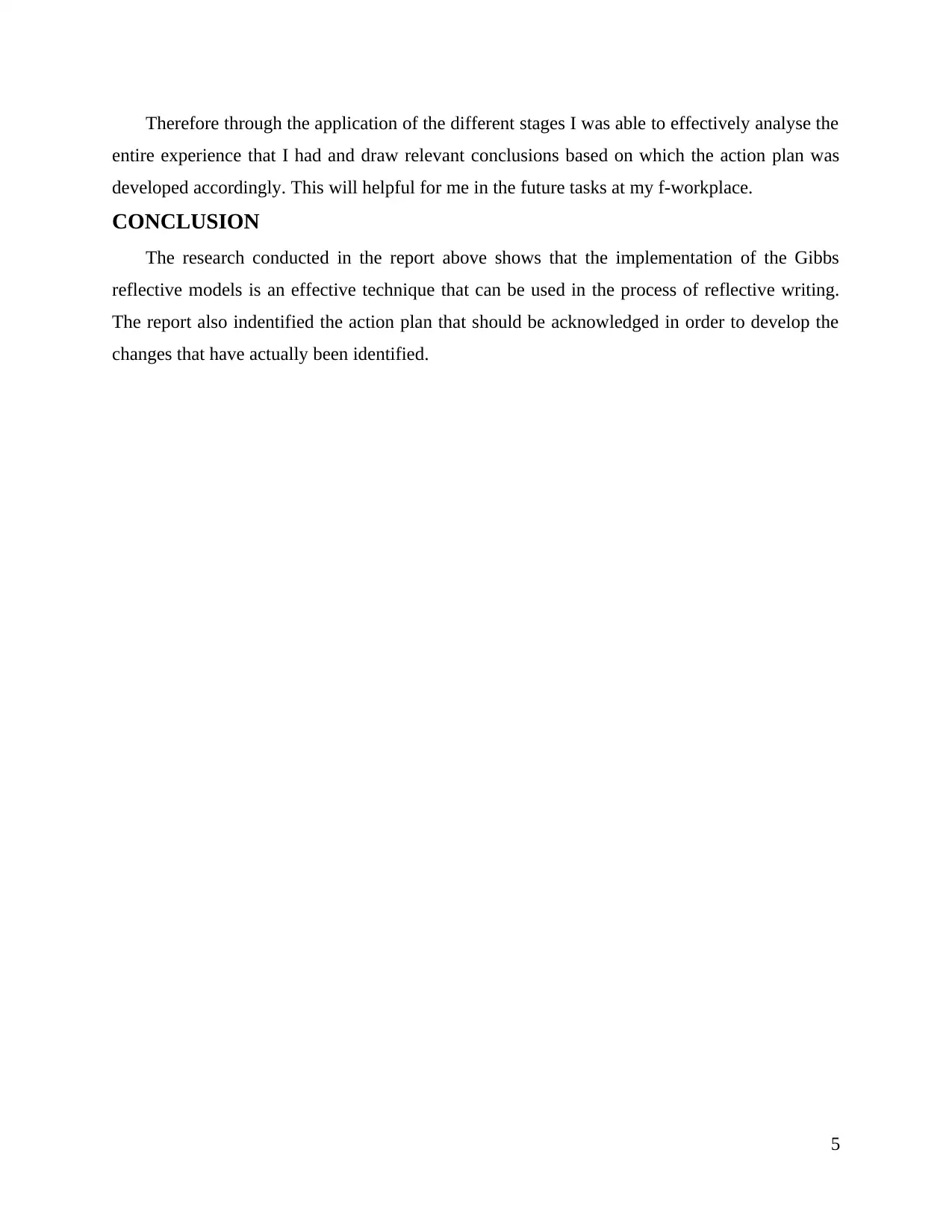
Therefore through the application of the different stages I was able to effectively analyse the
entire experience that I had and draw relevant conclusions based on which the action plan was
developed accordingly. This will helpful for me in the future tasks at my f-workplace.
CONCLUSION
The research conducted in the report above shows that the implementation of the Gibbs
reflective models is an effective technique that can be used in the process of reflective writing.
The report also indentified the action plan that should be acknowledged in order to develop the
changes that have actually been identified.
5
entire experience that I had and draw relevant conclusions based on which the action plan was
developed accordingly. This will helpful for me in the future tasks at my f-workplace.
CONCLUSION
The research conducted in the report above shows that the implementation of the Gibbs
reflective models is an effective technique that can be used in the process of reflective writing.
The report also indentified the action plan that should be acknowledged in order to develop the
changes that have actually been identified.
5
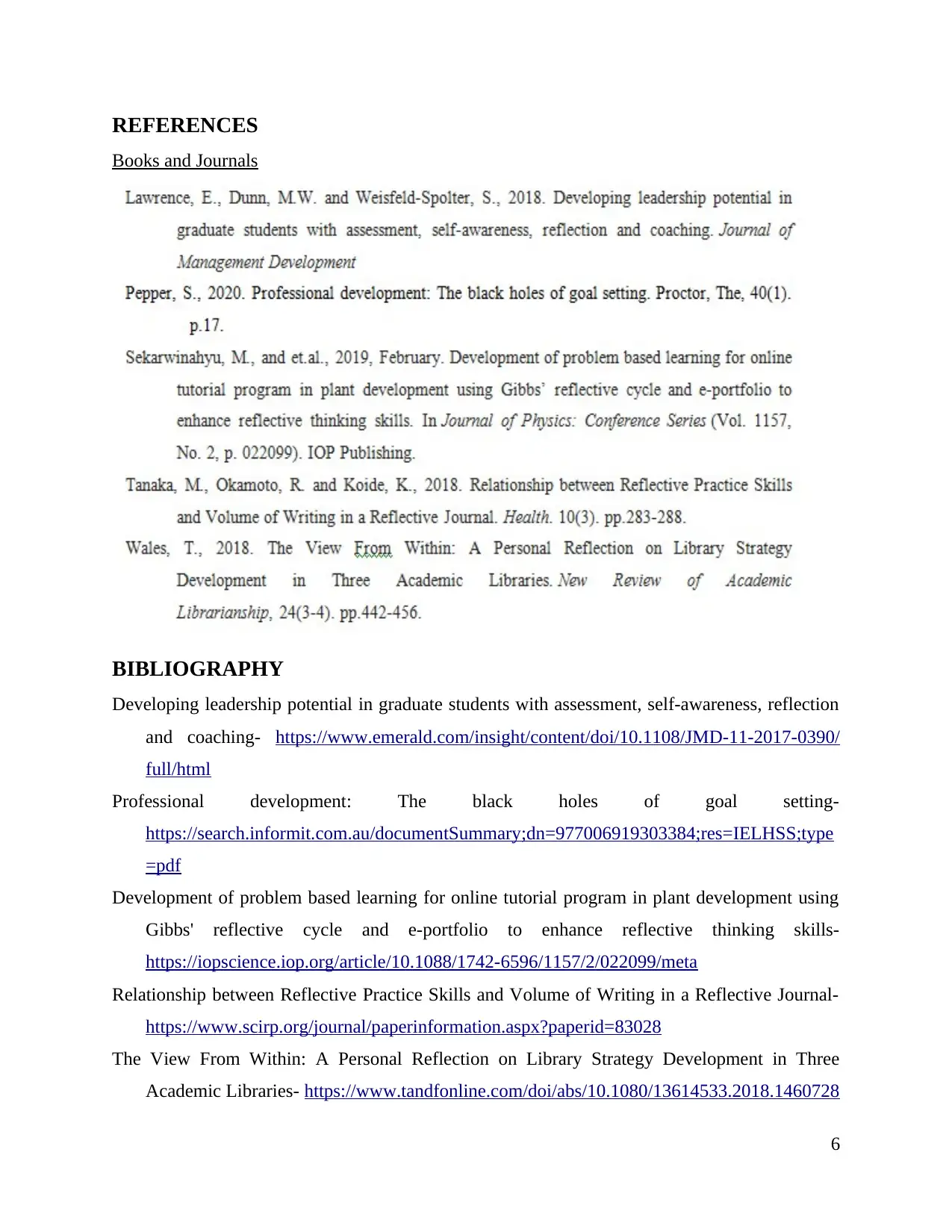
REFERENCES
Books and Journals
BIBLIOGRAPHY
Developing leadership potential in graduate students with assessment, self-awareness, reflection
and coaching- https://www.emerald.com/insight/content/doi/10.1108/JMD-11-2017-0390/
full/html
Professional development: The black holes of goal setting-
https://search.informit.com.au/documentSummary;dn=977006919303384;res=IELHSS;type
=pdf
Development of problem based learning for online tutorial program in plant development using
Gibbs' reflective cycle and e-portfolio to enhance reflective thinking skills-
https://iopscience.iop.org/article/10.1088/1742-6596/1157/2/022099/meta
Relationship between Reflective Practice Skills and Volume of Writing in a Reflective Journal-
https://www.scirp.org/journal/paperinformation.aspx?paperid=83028
The View From Within: A Personal Reflection on Library Strategy Development in Three
Academic Libraries- https://www.tandfonline.com/doi/abs/10.1080/13614533.2018.1460728
6
Books and Journals
BIBLIOGRAPHY
Developing leadership potential in graduate students with assessment, self-awareness, reflection
and coaching- https://www.emerald.com/insight/content/doi/10.1108/JMD-11-2017-0390/
full/html
Professional development: The black holes of goal setting-
https://search.informit.com.au/documentSummary;dn=977006919303384;res=IELHSS;type
Development of problem based learning for online tutorial program in plant development using
Gibbs' reflective cycle and e-portfolio to enhance reflective thinking skills-
https://iopscience.iop.org/article/10.1088/1742-6596/1157/2/022099/meta
Relationship between Reflective Practice Skills and Volume of Writing in a Reflective Journal-
https://www.scirp.org/journal/paperinformation.aspx?paperid=83028
The View From Within: A Personal Reflection on Library Strategy Development in Three
Academic Libraries- https://www.tandfonline.com/doi/abs/10.1080/13614533.2018.1460728
6
⊘ This is a preview!⊘
Do you want full access?
Subscribe today to unlock all pages.

Trusted by 1+ million students worldwide

7
1 out of 7
Related Documents
Your All-in-One AI-Powered Toolkit for Academic Success.
+13062052269
info@desklib.com
Available 24*7 on WhatsApp / Email
![[object Object]](/_next/static/media/star-bottom.7253800d.svg)
Unlock your academic potential
Copyright © 2020–2025 A2Z Services. All Rights Reserved. Developed and managed by ZUCOL.





